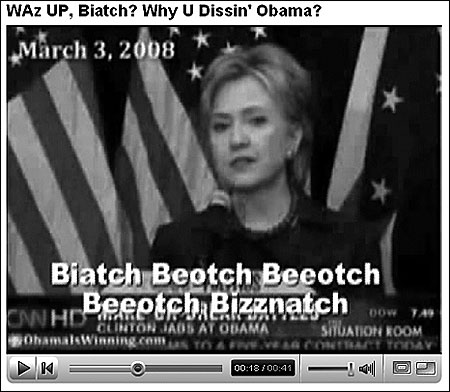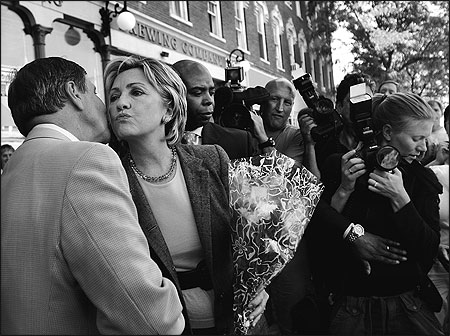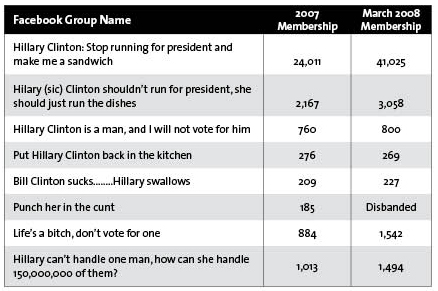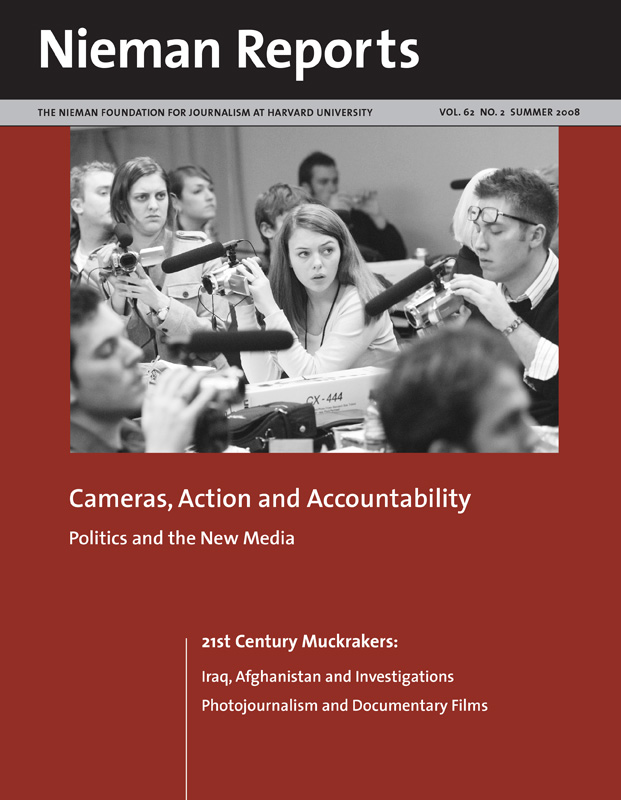
On November 13, 2007 in Hilton Head, South Carolina, a middle-aged female member of the audience asked Republican presidential contender Senator John McCain,"How do we beat the bitch?" Amid audience laughter and despite a cautioning call from a male in the audience who advised the senator to "leave it alone," Senator McCain responded, "May I give the-ah, may I give the ah translation?"
RELATED WEB LINKS
"How Do We Beat the Bitch: Extended Version."
Retrieved April 28, 2008 from YouTube.com.
"McCain Supporter: How Do We Beat the Bitch?"
Retrieved April 28, 2008 from YouTube.com. McCain then added: "But that's an excellent question. You might know that there was a, there was a poll yesterday, a Rasmussen poll identified that shows me three points ahead of Senator Clinton in a head-to-head match up. I respect Senator Clinton. I respect anyone who gets the nomination of the Democrat Party."
As news accounts of the McCain exchange suggest, the word "bitch" is still taboo in mainstream broadcast and cable. However, what is gingerly treated as the "b" word in those venues is more often cast as BITCH on Facebook and as doctored visual equivalents on YouTube. On CNN's "The Situation Room," Washington Post media critic and CNN "Reliable Sources" host Howard Kurtz observed that "Senator McCain did not embrace the 'b' word that this woman in the audience used." ABC reporter Kate Snow adopted the same locution. On CNN's "Out in the Open," Rick Sanchez characterized the word without using it by saying, "Last night, we showed you a clip of one of his supporters calling Hillary Clinton the b-word that rhymes with witch." A local Fox 25 news reporter made the same move when he rhymed the unspoken word with rich. [See related Web link.]
Some of the uses actively signaled disapproval. On CNN, Sanchez encapsulizes the woman's question by saying, "She refers to Hillary Clinton using really what is a horrible word that is used to do nothing but demean women…. Obviously, the word that's used here is very offensive." Others tacitly approved. "But what Republican voter hasn't thought that? What voter in general hasn't thought that …?" asked Politico's Mike Allen on CNN's "American Morning" the day after it happened. Resonant or not, Allen did not employ the word himself.
The range of responses on YouTube and Facebook was wider and less telegraphic. "How do we beat the bitch?" — a YouTube video posting of the McCain exchange — elicited more than 4,000 posts by the end of April, some disapproving, most applauding the questioner's characterization of the Democratic contender. At one end of that spectrum, a respondent observed:
[A] gentleman would have pointed out the inappropriateness of the question. If Hillary were a man no one would refer to her like that. A strong woman is just a threat to many people. McCain should have objected to the term and then answered the question tactfully.
At the other, a posting complaining about the characterization elicited the comment:
Dude, what's your problem? Hillary isn't really a bitch, anyway. We all KNOW that. She's actually a CUNT!
The Web's visual capacity means a candidate's fans and foes can post video attack and advocacy. Entering "Hillary" and "bitch" we found more than 500 YouTube videos. The titles include "Hillary Clinton: Crazy Bitch!" (5,629 discrete views), "Hillary Sucks" (16,178 discrete views) and "FAT ASS: Hillary FUCKING Clinton the BITCH" (2,742 discrete views). Many of the 500 featured doctored photomontages of the former first lady. One, titled "WAz UP, Biatch? Why U Dissin' Obama?" (351 discrete views) forecasts the death knell of the Democratic Party on Election Day 2008 before proclaiming, "Here's the bitch that did it." The screen then shows a barking German shepherd, teeth bared. "Oops," says the announcer, "Wrong Bitch," as the visuals cut to a picture of Hillary Clinton.
RELATED WEB LINK
"How do we beat the bitch—Hillary Clinton Debate Remix."
Retrieved April 28, 2008 from YouTube.com.Some of the videography was matched to music. Shortly after the McCain exchange appeared on YouTube, plasticrev24 posted "How do we beat the bitch" (6,486 discrete views), a music video that flashed photos of Hillary Clinton in debates as the lyric "I'll beat that bitch with a hit" is repeated. The video then shifts to a female vocalist whose lines include: "Bump me pimp and untie me/ Show me you'll show me/ How you take that chance/ And beat this bitch with a hit." The video closes with audio from the McCain exchange in Hilton Head. We learned that the number of views for the 500 videos ranged from a high of 1,107,162 (the McCain exchange posted under the title "Beat the Bitch") to a low of 15 ("Which Hillary for President").
Roundly outnumbered were videos objecting to "bitch" as a synonym for the New York senator. There were 111 videos that directly attacked Senator Clinton in disparaging gendered terms; 21 objected to those characterizations. The defenders include "Hillary Rodham Clinton-End Sexism and the 'B' Word," which asks, "If Obama was called the 'n' word, would you be so calm?" That video concludes with the appeal to "Stop calling Hillary the 'bitch' word, now."

Hillary Clinton in Nashua, New Hampshire. May 2007. Photo by Lori Duff/Concord Monitor.
Tracking Video Messages
Although postings on YouTube are primarily pseudonymous, those on the social networking site Facebook often identify their sources. Late last November, we entered Senator Clinton's name in that search engine, a strategy we repeated after this winter's March 4th primary voting. These searches located groups that identified themselves in hostile gender-based ways and permitted us to ask how, if at all, their self-presentation changed across that three-month period.
Founded in February 2004, Facebook members create social networks or affinity groups that others can join. Originally limited to college students, in 2006 the site expanded to include corporations, high school students, and eventually anyone with an e-mail address. Members post comments on the "wall" of their group. Only the group "administrator" can edit content or disable the discussion function. When members report offensive material, site Web masters decide whether to take such actions that can include banning the group or specific members.
Our first Facebook search yielded more than 500 hits. From this list we isolated eight groups that had attracted at least 100 members. [See accompanying graph to see data we collected.]
AUTHOR'S NOTE
Jonathan Tilove, “Analysis,” Newhouse News Service, November 28, 2007.During the three months of our study, some groups attracted members, others disbanded. A group calling itself "Punch her in the cunt" had 185 members in November but disbanded prior to our second search. Membership nearly doubled for the group "Hillary Clinton: Stop running for President and make me a sandwich" between November (24,000 members and 2,000 postings) and March (41,000 members). In early 2008, the group administrator disabled the wall option because of what he saw as inappropriate commentary by both Clinton critics and supporters. Before the postings were suspended, the site's creators elicited some unwanted mainstream news attention. Called for an interview by Jonathan Tilove of Newhouse News Service, one of them declined, saying, "As young college students, we have careers to worry about, and having our name tied with a Facebook group that has been labeled sexist is not something that we are proud of.… We are sorry that we cannot help you in your article, but we do not want to jeopardize our careers over a joke that … we started in high school." [See author's note.]

To determine how members reacted to vulgar gender-based attacks, we tallied the objections voiced on two of the sites. Such protests were few and far between. On "Life's a Bitch, Why vote for one?," there were 18 objections within 1,751 wall posts. On "Hilary (sic) Clinton shouldn't run for president, she should just run the dishes," 19 of 1,055 posts challenged what they saw as sexist wall comments.
When gender-based attacks on the sites drew objections, often from those urging a focus on policy differences not sexist attacks, the responses discouraged similar complaints. Some were attacked for lacking a sense of humor. Others elicited vulgar dismissals. When a female high school student reported that despite the fact that she was not a Hillary Clinton supporter, she was sickened "that someone would make a group like this," a male peer responded with "hey shut up cunt."
Groups also emerged to take on those attacking Senator Clinton. "Be a man, iron your own shirt" was formed in response to groups such as "make me a sandwich" and "life's a bitch." Its self-definition expresses "frustration and disgust" with those joining the other groups. By the end of April, this group attracted 99 members.
RELATED WEB LINK
"Bitch is the new Black!"
Retrieved April 29, 2008 from YouTube.com.In the battle for membership, one Facebook group reframing the word "bitch" as a badge of honor attracted substantially more members than those dismissing the Clinton candidacy on sexist grounds. When in a February 23, 2008 "Saturday Night Live" skit Tina Fey reminded viewers that "bitches get stuff done," the Facebook site "Bitch is the new Black" appeared. The group was formed in response to that "Saturday Night Live" skit, which had been posted in audio form on YouTube. In the sketch Fey had stated:
I think what bothers me the most is when people say that Hillary is a bitch. Let me say something about that. Yeah, she is. And so am I.… You know what? Bitches get stuff done. That's why Catholic schools use nuns as teachers and not priests. Those nuns are mean old clams, and they sleep on cots, and they're allowed to hit you. And at the end of the school year you hated those bitches, but you knew the capital of Vermont. So, I'm saying it's not too late, Texas and Ohio. Get on board. Bitch is the new black!
By March 12, that Facebook group had 22,721 members, compared with more than 7,000 people in groups whose titles included the words "Clinton" and "Bitch" and another 2,000 in groups titled "Clinton" and "man." On YouTube, a video by ShutTheFreudUp titled "Hillary Clinton: Mad as Hell/Bitch" (154,098 discrete views) recast the pejorative use of "bitch" in a similar fashion by playing Meredith Brooks's song "Bitch" ("I'm a bitch. I'm a lover. I'm a child. I'm a mother ….") as it displaced sexist images with appeals to support Clinton's candidacy.
It is important to note that, overall, the audience for the most misogynistic of the Internet sites is relatively small, with the most vulgar drawing the fewest members and views. Where vulgar sexist comments once found a home on restroom walls and inside the confines of spaces the users regarded as sealed from public view, they are now exhibited in public Internet space. The resulting display fails to satisfy a high democratic ideal. However, a self-policing function seems apparent in the voluntary closing of some of the sites and the removal of others. Moreover, the emergence of sites challenging and reframing content that the sponsors find offensive suggests a productive means of response.
Finally, the impact of the old media on the new is reflected in two phenomena: The Facebook site that reframed "bitch" was based on a comedy segment from mainstream media, and the founders of one of the larger Facebook sites were chastened by mainstream media exposure.
Kathleen Hall Jamieson is a professor at the Annenberg School for Communication at the University of Pennsylvania, director of its Annenberg Public Policy Center, and coauthor of "Presidents Creating the Presidency" (University of Chicago Press, 2008). Jacqueline Dunn is a research analyst at the Annenberg Public Policy Center of the University of Pennsylvania.



